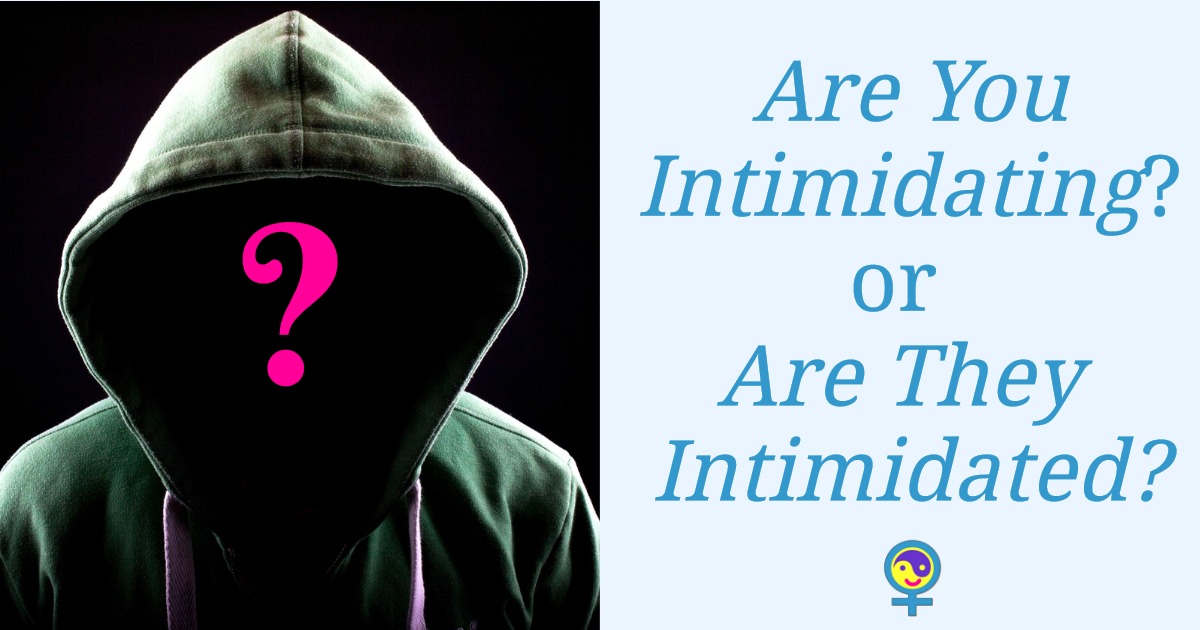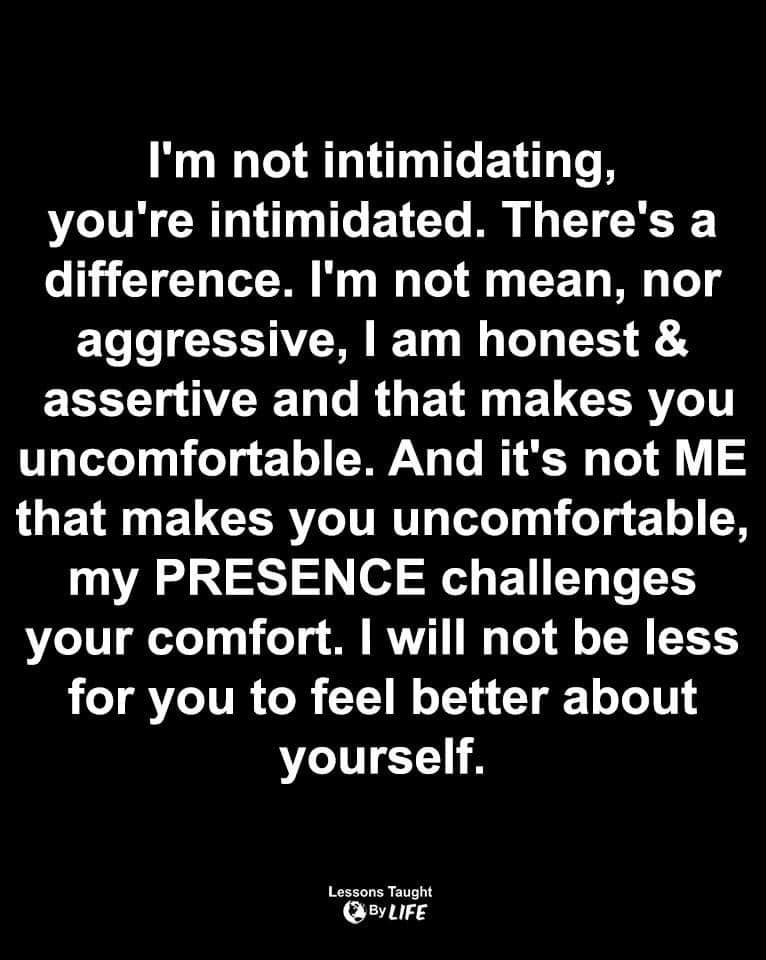
There’s a very important difference between being intimidating and someone being intimidated by you. Let’s discuss…
According to Dictionary.com, intimidating is an adjective meaning:
-
- “intended to frighten someone or to force or stop someone’s action through fear
- causing timidity, hesitancy, or anxiety, especially because of difficulty or risk; daunting:
- causing someone to feel overawed or cowed, as through force of personality or superior display of wealth, talent, rank, etc.”
Intimidation Is Power
Intimidation is an aggressive, intentional act of exerting one’s power over another person. However, the term is often misused by insecure people who use it as an admonishment of someone who has attributes that they lack.

Energy Is Everything
I have been called “intimidating” by people who had far more power than I did. This has always shocked and hurt me, as I care deeply about others and have no desire to overpower or frighten them. That is literally the opposite of my intention.
Most people recognize this in me quickly, telling me that they feel good in my presence or that they know they can trust me. Animals often sit at my feet, affirming that my energy feels safe. But, to others, that same energy is intimidating. It has been very confusing.
My Intimidation Story
One of the first times I was directly called “intimidating,” I was in my twenties working at a very small company. My manager openly took credit for my writing projects and made catty comments to other women on our team, like, “Women with short hair are so much more professional than women with curly hair.” I was clearly in the curly-haired camp.
Her childish, mean-girl behavior was shocking since she was at least twenty years my senior and, as a member of the four-person executive team, had far more power than I did in that work environment. Regardless, one afternoon she pulled me into the conference room to chat about my work.
There, she chastised me for intimidating her. I was stunned and on the verge of tears. I asked for an example, wanting to correct my behavior. She responded by saying that I was thin and that one of the senior partners respected my opinion.
As an aside, my thinness was fairly new since I had unexpectedly dropped 20 pounds after the hypothyroidism I’d battled for a decade was finally being treated. There was clearly nothing I could do to correct the situation. I really liked the work I was doing, but I felt bullied daily and left a short while after that bizarre meeting.
Being Thin is NOT Intimidation
I had a similar encounter a few years later with a woman I thought was one of my closest friends. She also told me I intimidated her. When I pressed the issue, completely distraught by the fact that I had bent over backwards to be a kind, loving friend to her, she told me that my thighs were thin and it made her self-conscious. Our friendship ended abruptly.
My heart ached over that loss for years. There were many times prior to that incident where she had said cruel, petty things to me, yet I was the intimidating one. It never made sense. But, again, I felt powerless to change the situation and ended up losing most of my social circle, of which she was a leader.
Who’s The Wolf?
I gained a bit more clarity nearly a decade later when a dear friend was accused by an administrator at her work of being “a wolf in sheep’s clothing.” My friend is the most honest, kind, considerate, and dedicated person I know. She has given everything to her career, always going above and beyond. When I heard her story of being essentially called an intimidating presence, I felt a little better about my own experiences. I started to see that we don’t have to have any ill intent to be a threat to the true wolves.
The Real Intimidators
It took me far too long to understand that when someone accuses me of something I’m not intentionally doing or something that I can’t even control, they are likely manipulating me. They are not the victims they are portraying themselves to be. They are, instead, the predators.
Labeling someone as “intimidating” for merely existing is how insecure or narcissistic people attempt to lower another person’s self-esteem so they can feel better about themselves. For years, this abusive tactic worked on me, causing me a great deal of unwarranted shame and grief.
This is what I share regarding this topic in my course on healing from narcissistic abuse:
“…as a form of projection, narcissistic individuals often accuse people of “intimidating” them. It is not true intimidation, which refers to a conscious act of trying to make another person feel afraid or lose confidence. An insecure narcissist feels threatened or frustrated when anyone else gets more attention than they do. That leads them to mislabel that other person as “intimidating” or “threatening,” when that person has no ill intent whatsoever. It is a childish and cruel way of criticizing someone for having qualities they wish they had.”
Saved by a Meme
I finally got true clarity on this perplexing issue from seeing memes on this topic. There are quite a few that discuss the concept, particularly in relation to women, who are most frequently mislabeled as “intimidating.”
It felt like synchronicity that the meme above showed up in an empath group I follow, pushing me to write this blog. It was posted by a woman who said she was conflicted by the message, thinking it was too polarizing.
I was amazed to see that most of the comments condemned the content, saying it was too aggressive and cruel. Some women even said they felt the content was narcissistic, as if the creator’s intent was to manipulate or overpower others.
The Empathy Trap
It was weird to witness people condemning the act of standing firm in one’s truth with confidence and clarity. This is the danger of living with too much empathy and compassion.
These traits often lead a conscientious person to be too agreeable and meek. It amazes me how many kind people support and defend the very people who are trying to manipulate or bully them.
I have fallen into this trap far too many times. I won’t endure it any longer. I don’t want anyone else to either. If success “intimidates” someone, that’s their problem. Shining brightly is not intimidation; it is liberation.
If you are interested in learning more about healing from narcissistic abuse, please check out my new course “Free From Narcissists.”
Michelle Gibeault Traub is a health writer, compassionate coach, and the author of Free From Narcissists and Online Dating for Sensitive Women. Her mission is to help women be their best in body, mind & spirit. Sign up for Michelle’s FREE Gifts – The Natural Healing Toolkit and 33 Ways to Add More Joy to Your Life.

It’s amazing how much of our lives can be eaten up by making ourselves smaller to suit the fragile egos of others. A great read – thank you Michelle!
Thanks Damian! It really is such a waste of energy in the long run. I am so grateful to have finally found clarity and like-minded people who honor and support me. Your work is such a gift! https://www.modastro.com/
Thank you!
Have been wondering how come some people seem to find me intimidating. Especially since most seem to feel safe around me.
It certainly is weird to be accused of something that is contrary to how you really are. I am learning to always question accusations like that, and seek the honest opinions of others.